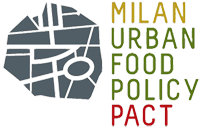Recent news
Milan Urban Food Policy Pact

Cities host over half the world’s population and have a strategic role to play in developing sustainable food systems and promoting healthy diets. While every city is different, they are all centres of economic, political and cultural innovation and manage vast public resources, infrastructure, investments and expertise.
Considering this, Milan advocated an international protocol to engage the largest number of world cities for the development of food systems, based on the principles of sustainability and social justice. The activities started in September 2014, when Milan and over 40 cities from every continent began to exchange views to define the contents of the Pact through video-conferences. Since then, 133 cities have signed the Milan Urban Food Policy Pact.
The purpose of the Urban Food Policy Framework for Action is to provide strategic options to those cities aiming to achieve more sustainable food systems. The Framework builds upon the direct experience of participating cities and takes into account relevant diverse commitments, goals and targets. While the options have been organized into thematic clusters, they should be seen as entry points towards achieving the common goal of sustainable food systems. Most interventions (such as school meals or community gardens) may fall under the jurisdiction of more than one municipal agency or department. Most interventions will have an impact on multiple dimensions (economic, social, health and environment) of sustainable development.
Links to the Milan Urban Food Policy Pact and related news is available on their website.
